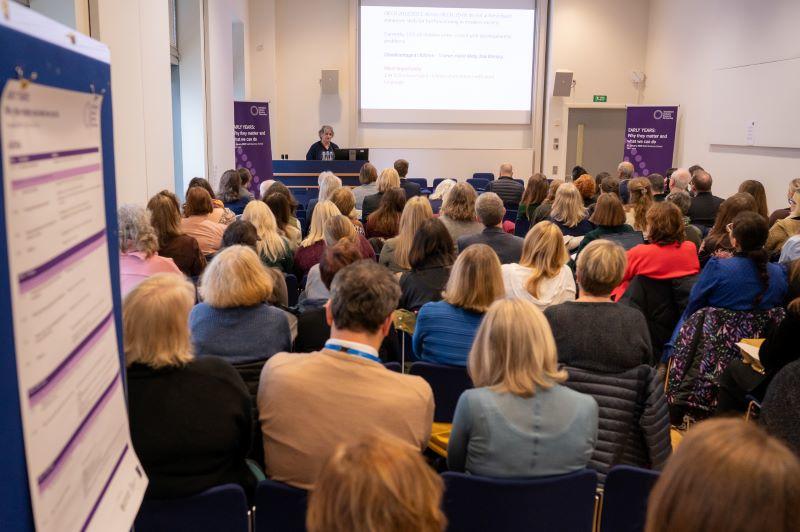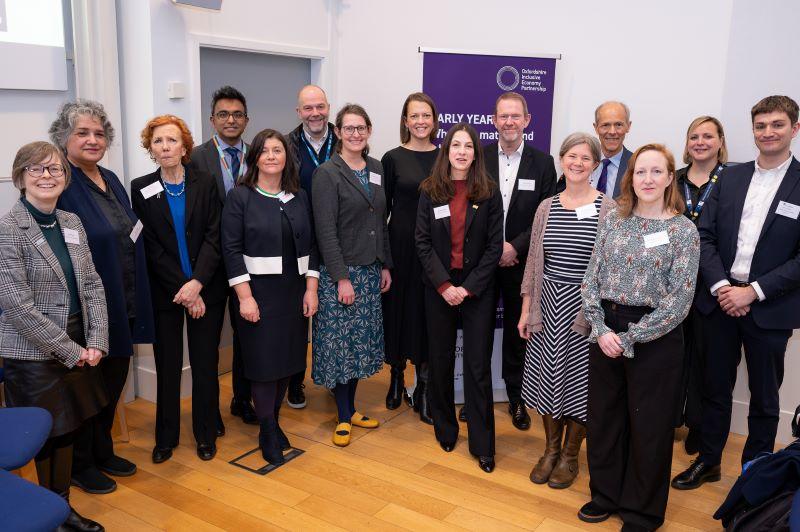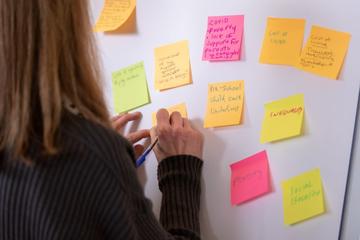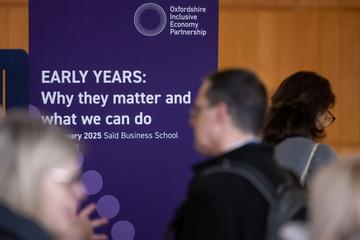Early Years summit highlights opportunities to support Oxfordshire's youngest residents
Leading social scientists from the University of Oxford and Oxford Brookes University have joined collaborators from healthcare, policy, childcare, charity, and business sectors across the UK to address the pressing challenges and opportunities facing early years provision in Oxfordshire.
In a landmark summit at the Saïd Business School in Oxford, Early Years: Why They Matter and What We Can Do highlighted the critical role that early childhood development plays in shaping a thriving, inclusive economy and explored practical, evidence-based strategies to support young children and their families. Hosted by the Oxfordshire Inclusive Economy Partnership (OIEP) in partnership with the University of Oxford’s Social Sciences Division, Buckinghamshire, Oxfordshire, and Berkshire West Integrated Care Board (BOB ICB), and Oxfordshire County Council, the day’s discussions focused on understanding what the research evidence can tell us, mobilising existing resources, fostering integrated approaches across systems, and identifying key areas for investment to benefit both residents and the local economy.

Iram Siraj, Professor of Child Development and Education at the University of Oxford, addresses the Early Years Summit. Credit: Steve O'Gorman
Tackling Disparities in Early Childhood Development
Despite Oxfordshire’s global reputation for educational excellence, the county faces a significant opportunity to better support children from disadvantaged backgrounds. Research shows that these children start school 5.5 months behind their peers in terms of a Good Level of Development at the Early Years Foundation Stage (EYFS). This gap, if unaddressed, can widen to over 21.5 months by age 16, with significant implications for long-term outcomes in education, health, and employability.
This disparity highlights the importance of early intervention and systemic support. Delegates at the summit explored ways to tackle these challenges collaboratively, emphasising the economic and social benefits of investing in early years provision.
Insights and Evidence-Based Solutions
Delegates at the summit heard from leading academics, national experts, and practitioners. Highlights included Sally Hogg, Assistant Director of Programmes and Impact at The Royal Foundation, describing how the first five years shape the rest of a person’s life, and Phil Ponsonby, Group CEO of The Midcounties Co-operative, demonstrating how prioritising early years provision and creating a supportive culture for parents makes sense for his business.
Discussions drew on findings such as the Royal Foundation's commissioned report with Deloitte, which estimates that investing in early childhood adds £45.5 billion to the national economy annually. Presenters also addressed the heightened risks faced by disadvantaged groups, including poor health, social and emotional challenges, and cognitive delays—all of which influence long-term literacy, employability, and wellbeing.

Delegates from academia, business, policy, practice and the third sector came together to explore challenges and opportunities for improving Early Years provision in Oxfordshire. Credit: Steve O'Gorman
Building a Collaborative Path Forward

Challenges facing Early Years provision. Credit: Steve O'Gorman
The summit underscored the need for integrated, cross-sector collaboration to support early childhood development. Delegates discussed strategies to invest in preventive measures, harness existing community assets, and align resources effectively to create a supportive ecosystem for young children and their families. These steps are essential to achieving long-term savings and fostering a more equitable future for all.
Jeremy Long and Baroness Jan Royall, co-chairs of the OIEP, said: “From the outstanding range of speakers who spoke on the subject, from both academic research and practical experience, it is clear just how important the early years are for development, and optimising outcomes in later life.
“Investment at this stage has both profound social benefits to the individual, and also wider economic benefits compared to the cost of later interventions.”
“As the OIEP, we were very pleased to have worked in partnership with the University of Oxford, Oxfordshire County Council, and the BOB Integrated Care Board to have made this event possible, and to highlight this very important topic.”
Sally Hogg, Assistant Director of Programmes and Impact at The Royal Foundation, said: “It was great to join the Oxfordshire Inclusive Economy Partnership Summit today and hear about the fantastic work happening across our communities, supported by third sector organisations, local authorities, health services, and employers.
"Projects like Growing Minds with Homestart Oxford, Peeple, and Berin Centre showcase compassionate, community-led, strengths-based values, connecting with families who might not engage with other services. It was inspiring to hear about public service initiatives, such as additional health visiting contacts and support groups for families awaiting paediatric services, alongside academics from Oxford's universities bringing research to life to inform local decisions.
"I hope today sparks valuable conversations and drives even more action for Oxfordshire’s children and families.”
Aileen Marshall-Brown, Head of Engagement for Social Sciences Division, said: “It was inspirational to hear our social scientists contribute their research evidence and expertise to such an important discussion, bringing together academic insights with views, learning and experiences from policy, practice, the voluntary sector and business.
"The collective sense of urgency and motivation to improve Early Years provision was truly palpable, and by working together across these sectors we really can make a difference. Our responsibility in the social sciences is to ensure that our research continues to support action on the ground in Oxfordshire to improve the lives of our youngest residents.”
About the Oxfordshire Inclusive Economy Partnership (OIEP)

Credit: Steve O'Gorman
The OIEP brings together organisations from across the public, private, and voluntary sectors to create a more inclusive and sustainable local economy. The partnership is committed to tackling inequalities and driving systemic change for the benefit of all Oxfordshire residents.
The University is a member of the OIEP partnership. If you would like to find out more about the University’s involvement, contact partnerships@socsci.ox.ac.uk
Find out more at oiep.org.uk


